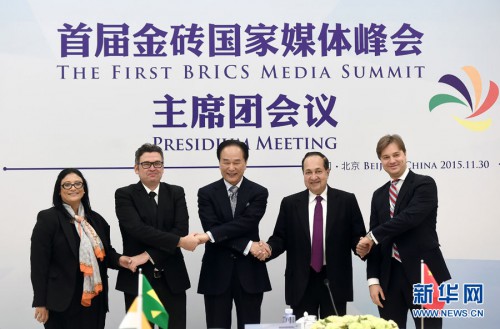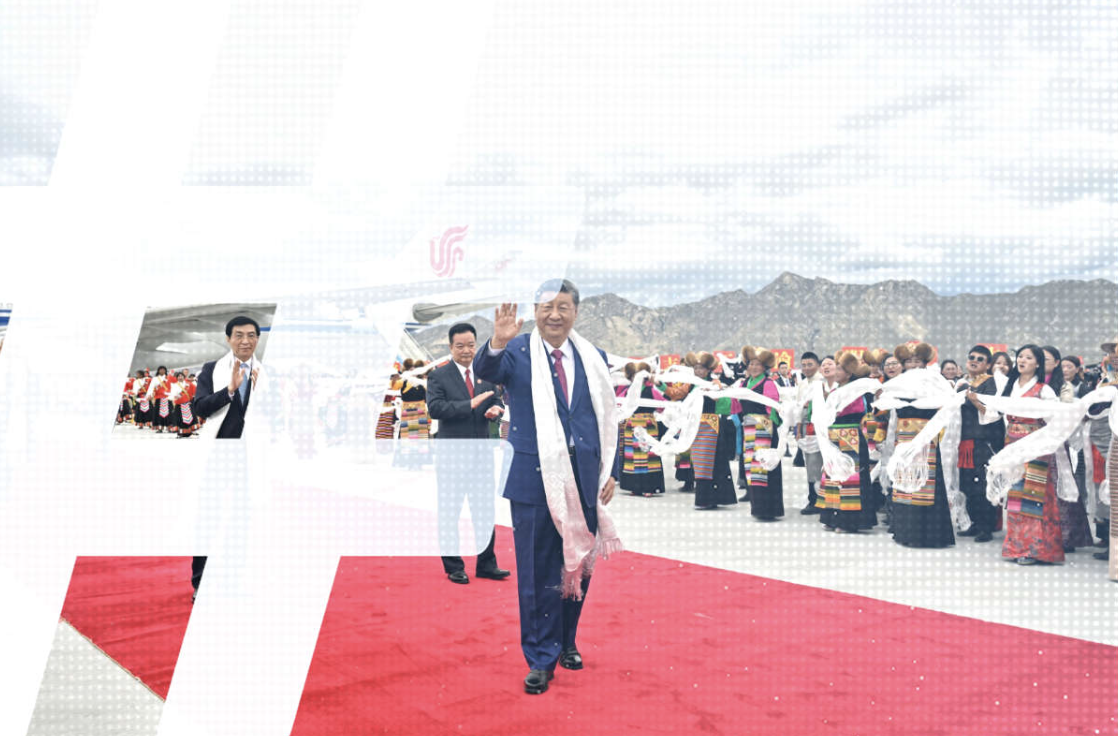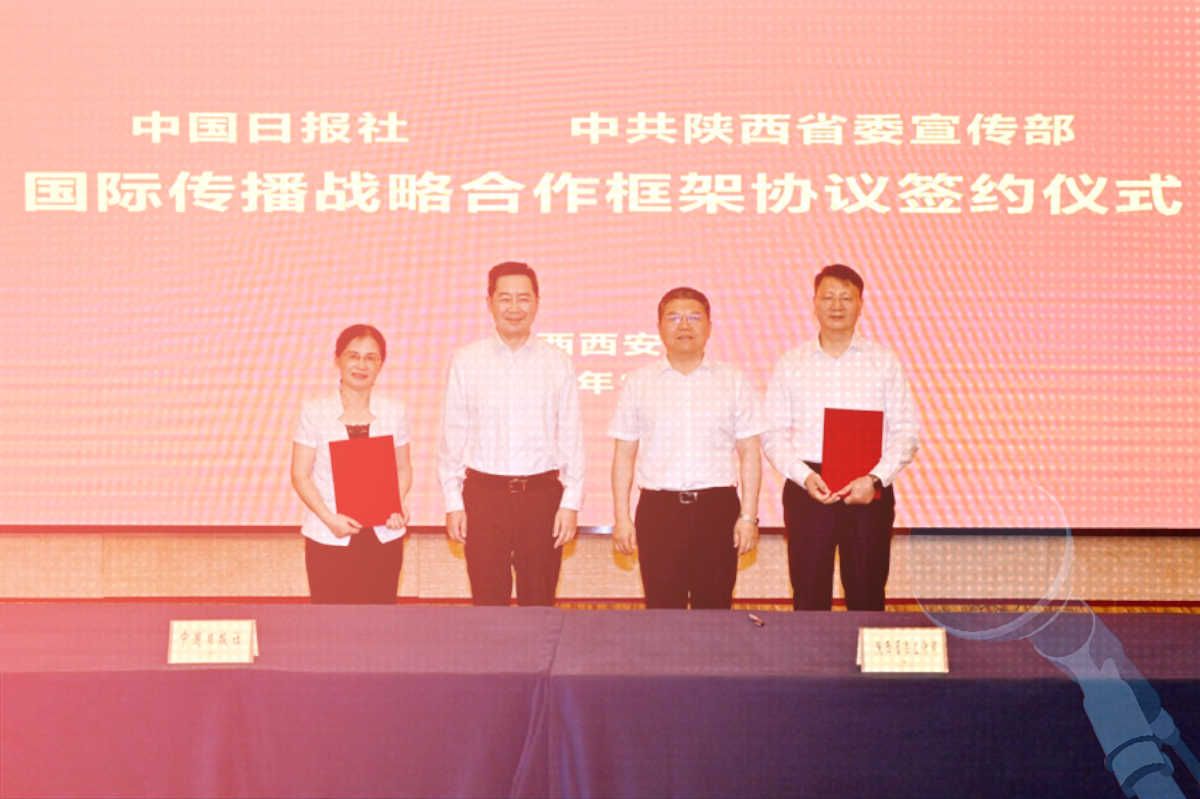On Monday and Tuesday this week, as a noxious cloud of pollution sat across a broad swathe of northern China, the country’s immense environmental challenges made international headlines, even as China’s president attended climate talks in Paris. The irony, not at all lost on Chinese, was a sore point for propaganda officials. They scrambled against all odds to position the story, purging snide posts on social networks and pushing knottier questions, like why the government hadn’t issued a “red alert,” onto trusted state news sources, like the official Xinhua News Agency.
Meanwhile, at the headquarters of Xinhua News Agency, just two blocks west of Tiananmen Square, media representatives from the world’s five emerging national economies, known collectively as the BRICS (Brazil, Russia, India, China and South Africa), gathered to discuss — according to their Chinese hosts — how to strengthen the “international discourse power” of the member nations. They claimed — in any case, their hosts claimed — to “support the voices of the developing world.”

The elephant in the room, of course, was the West. Changing the strategically weak position of the BRICS countries in terms of information would mean, according to Xinhua, “changing the current situation in which Western media dominate the media industry.” More important was addressing the imbalance of agendas. Western industry dominance meant that the West had come to dominate the global conversation as well as the accepted facts that formed the basis of that conversation. “BRICS countries,” said an English-language report from China Central Television, “should have a bigger say on global issues such as climate change and cybersecurity.”
Many visiting media representatives believe that while the five BRICS nations have large populations and huge economies, with proportionally large contributions to the global economy, the BRICS nations have not yet attained an international communication capacity commensurate with their economic weight. The media of BRICS nations must strengthen their own capacity building, making their own voices heard in the global public opinion sphere. [SOURCE]
On the issue of climate change, let’s remember, these words were fired off by Chinese state media at precisely the time that the leaders of both China and India were in Paris for the COP21 climate change conference. Let’s also not forget that China has silenced its own powerful voices on environmental issues, including the much-lauded documentary “Under the Dome,” by journalist Chai Jing.
One of the key suggestions to emerge from the event, the first BRICS Media Summit (金砖国家媒体峰会), came from Dmitry Kiselev, director of the Rossiya Segodnya International Information Agency. He proposed that the BRICS nations “achieve an information ‘handshake,’” by which he meant strategic cooperation in the release of news and information that was — again, in the words of Xinhua — “timely and accurate, overcoming the interference caused by untrue reporting of BRICS countries by certain Western media.”
The first BRICS Media Summit in fact continues a discussion that began at BRICS Russia 2015 back in October, when representatives of major media groups from BRICS countries discussed the possibility of a “joint newswire” and a “joint broadcaster” to counteract the influence of Western media and create a “common information space.”
This is what Kiselev had in mind when he spoke this week of a strategic “handshake” — a strong, unbroken chain, if you will, of BRICS media.
And without further (editorialising) ado, I give you Kiselev’s own words, spoken at the opening of the summit, on the possibilities inherent in this “precious opportunity.” Or, hold on, perhaps these are Beijing’s words. There are no quotation marks, you see — and the voices are so very hard to distinguish.
Rossiya Segodnya International Information Agency Director General Dmitry Kiselev Calls for Creation of BRICS Nations Information Service and BRICS Nations Broadcaster
Xinhua Online, Beijing, December 1, 2015 — Bosses from 25 media agencies from 5 BRICS member states took part in the first BRICS Media Summit held in Beijing on December 1. Rossiya Segodnya International Information Agency Director General Dmitry Kiselev (基谢廖夫) delivered a speech at the opening ceremony.
Kiselev said he thanked his dear friends and was very happy. Like the rest of my Russian colleagues, [he said], I am delighted to have this opportunity to take part in the first BRICS Media Summit. Permit me first to thank Mr. Cai Mingzhao (蔡名照), [the head of China’s Xinhua News Agency], and his agency for their high level of work in organising [this event]. I thank you all for creating this very important platform for us. At the same time, I also thank Mr. Liu Qibao (刘奇葆), [the chief of China’s Central Propaganda Department], for his [recent] remarks. As he said, we must do our utmost as media to seize this precious opportunity, investing our strengths, and I hope our relationship of cooperation is a stable and reliable one.
Rossiya Segodnya held a media summit in Moscow back in October this year, and although it was not a media summit of BRICS member nations, it was a meeting among media leaders from BRICS nations. In the midst of those meetings, we discussed the building of a common information space (统一的信息空间) among Brazil, South Africa, India, China and Russia. For all of us, this is an extremely important issue, because I understand that we must do more to broadcast timely and effective information about our respective economic developments. I believe my colleagues here agree with my view, that the more important issue right now with respect to the transmission of information is how to guarantee reliable and accurate information sources. At present, the principle sources of information are the United States, Great Britain and other European nations. And their information sources are often not very accurate, and at the same time their information is transmitted to South Africa, to Brazil, to Russia — and the transmission of information that is not particularly accurate (不是特别准确的信息) tends to create problems. So we must create a common information space.
In Syria recently, a whole series events occurred, and related news coverage once again demonstrated that we our proposition and thinking here is extremely important. I hope that through our efforts we can communicate and transmit more accurate information. And I also hope very much that we can each make our own contributions [to this cause] through our respective efforts. To start off, I propose the following:
First, that we create an information network for BRICS nations (金砖国家的信息网). Through this information network we can publish or promulgate accurate information in a timely manner. At the same time we believe that such a proposal must receive the support of the various [BRICS] nations, and in fact it has already received the support of China and other BRICS members. The various member states have always done their utmost to ensure the accuracy and openness of information. And so, we hope very much that through our efforts we can achieve a tight and timely linking of hands in the area of information.
Second, and this was proposed by our news agency, we should create a broadcaster for BRICS nations. This is an issue we have already discussed, because everyone knows that every country has its own FM frequencies, and we should fully use these frequencies as information windows (信息的窗口). China, Russia, Brazil, India and South Africa all have their respective frequencies for information transmission. What’s more, we hope very much that this proposal from the Russian side receives your support and active response. On information cooperation (信息握手), we also hope to have your support and active response.




















